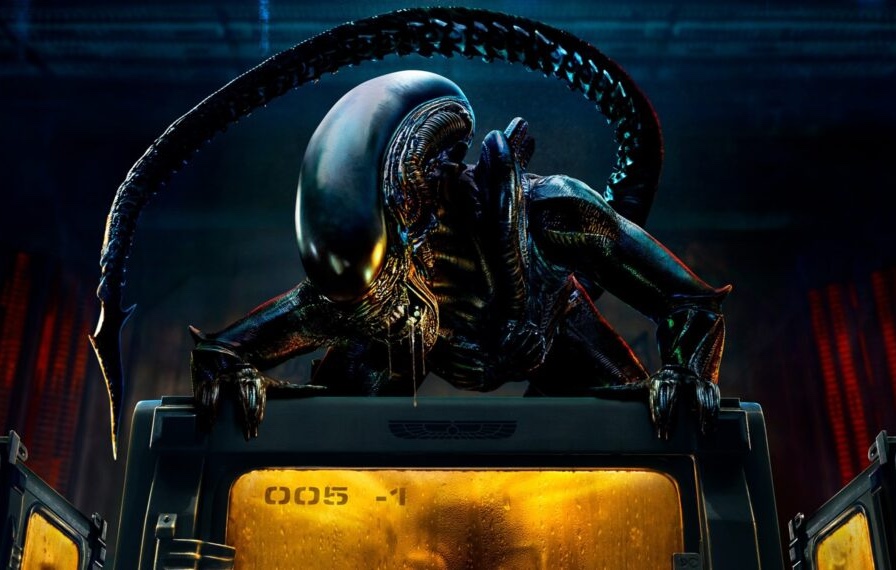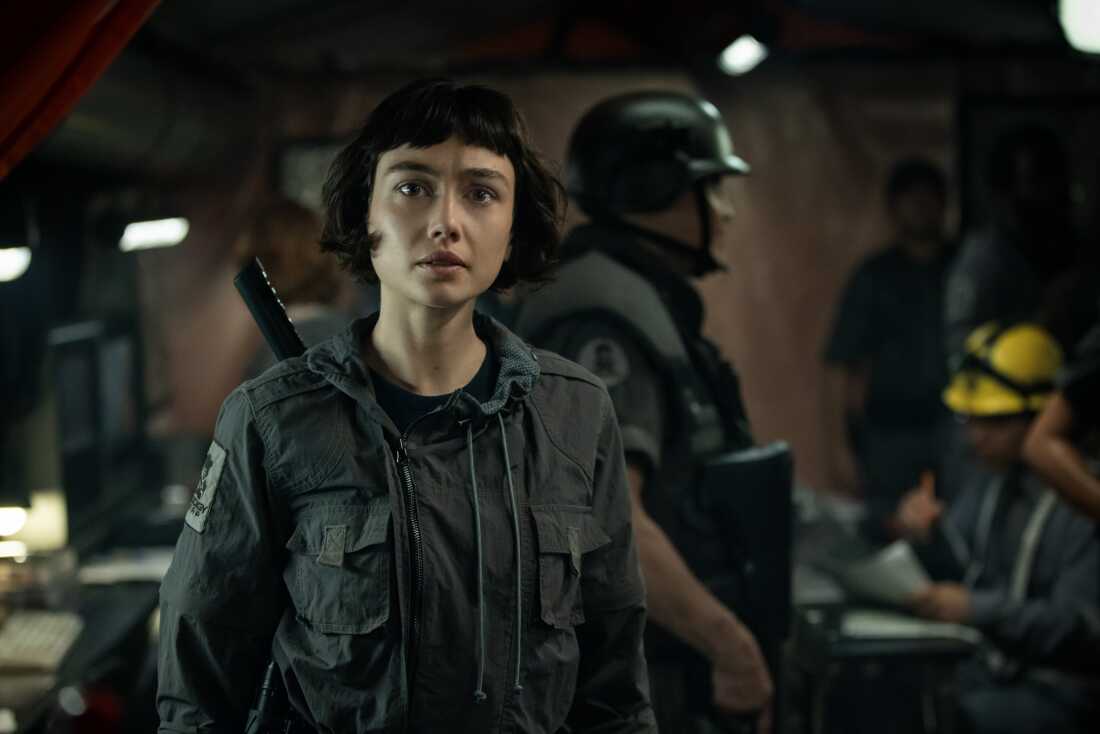Alien: Earth Is a Much-Needed Defense of Humanity
Noah Hawley’s new FX series, Alien: Earth, draws on the best of the sci-fi horror franchise to suggest humanity’s future might offer more than mere survival.

Still from Alien: Earth. (FX)
After two decades of clumsy crossovers and fumbling retreads, fans of 20th Century Fox’s Alien and Predator franchises are finally enjoying something of a golden age. Both beloved horror sci-fi franchises — one born in 1979 with Ridley Scott’s Alien, the other in 1987 with John McTiernan’s Predator — have been given a new lease on life in the 2020s with the standouts Prey (2022), Alien: Romulus (2024), and this year’s Predator: Killer of Killers.
However, those who lament our current age of IP cash grabs might be surprised to learn that Disney, who acquired 20th Century Fox in 2019, is driving this renaissance. And now, FX’s new show Alien: Earth is pushing the revival even further. In an era where major film and television properties are often held hostage by nostalgia, series creator Noah Hawley (Fargo, Legion) has found a way to walk the line between tradition and innovation in a way that is sure to quiet detractors.
While the dystopian Alien films have long stood out for dealing explicitly with class and rapacious capitalism, vague anti-corporate sentiment is now little more than a common trope in film and television — look no further than The Lego Movie’s villain “Lord Business.” But here, with Alien: Earth, Hawley deploys these themes to ask if humanity is capable of articulating a new, positive vision for future, one that goes beyond cynical anti-humanism or the fight for mere survival.
Set just two years before the events of the original 1979 film, Alien: Earth plunges viewers once again into the franchise’s trademark bleak, dystopian future. While returning home with a “Xenomorph” specimen — the familiar creature of the Alien films — a Weyland-Yutani Corporation research vessel crashes into a city controlled by its competitor, the Prodigy Corporation. In the process, the Company unwittingly delivers a lucrative potential bioweapon directly into the hands of their upstart competitor. As the two enterprises rush into the wreckage to grapple for control of the creature, they discover the horrifying monster is anything but a prize.
But it’s around this point, even as the show delivers on slimy monsters and gruesome kills, that Alien: Earth starts to reveal its true concerns, shifting the focus toward larger questions about the place of humanity in an age of unfathomably advanced technology.
Alien and the “Perfect Organism”
Though looking to honor the series’ roots, Hawley holds back on gratuitous fan service and tired easter eggs. Instead, we find a wide array of novel settings not seen in any of the five mainline Alien films, many of which suggest the new extremes of wealth and privilege in this future, including lush green environments, children’s playrooms, skyscrapers, and even an outlandish Louis XIV–themed dinner party that is broken up by an uninvited extraterrestrial guest.
In the first episode we meet Prodigy founder Boy Kavalier (Samuel Blenkin). Nervous and contemplative, he focuses on running Neverland, a research station and home to his group of “hybrids” — children whose minds have been implanted into humanoid bodies, imbuing them with extra-human power and the ability to manipulate technology. Kavalier dubs them his “Lost Boys.”
But the real standout of the series is Wendy (Sydney Chandler), the first hybrid born at Prodigy’s Neverland. Though still adjusting to life in her new body, Wendy asks Kavalier to send the hybrids into action when she discovers her brother is already at the crash site searching for survivors. Eager to see his creations at work, Kavalier casually sends off his Lost Boys into the darkness of the ship.

While hybrids and cyborgs are new to the Alien franchise, “post-human” characters are certainly not. In the original Alien, the science officer Ash (Ian Holm) is revealed to be a coldly malicious android in disguise. His loyalties lie strictly with the company — his fellow human crew members are all deemed expendable. After Ash is caught attempting to kill a fellow shipmate, he chillingly explains to the crew just what is so enchanting to his synthetic mind about the Xenomorph: it’s a “perfect organism” driven by pure survival instinct. Similarly, the 1986 sequel Aliens also foregrounds social critique, with the protagonist Ripley (Sigourney Weaver) directly condemning the greed that sets us on par with the monster; as she quips, “I don’t know which species is worse. You don’t see them fucking each other over for a goddamn percentage.” Even the most recent film in the franchise, Alien: Romulus (2024), finally revealed the brutal reality of what it means to labor in an outer space mining colony instead of just hauling the ore back across the stars.
Hawley’s Alien: Earth adds additional layers, which is where it thrives. In the show, we learn that humanity has reached a stage of total corporate domination, with Weyland-Yutani and rivals Prodigy, Lynch, Dynamic, and Threshold partitioning the planet into five massive territories akin to actual neofeudalism.
The subsequent reconfiguration of our society has produced a new urban landscape in the dynamic city of New Siam, with the poorest forced to live in the “Humanity Minus” tier of the city, located physically beneath their “Humanity Plus” and “Humanity Prime” social betters. Down below, the have-nots are forced into quasi-indentured servitude by their corporate masters, serving out lengthy contracts that can be extended by employers at will. The show’s shooting location, Bangkok, was also seen by Hawley as perfect for representing a world that is “about to get a lot hotter and a lot wetter.”
The Alien Franchise and Anti-Corporate Hollywood Tropes
In its best moments, the Alien franchise looks at how we navigate both the cramped spaces of the universe and the rigid confines of social circumstances. By finally opening up its physical environment, Alien: Earth expands the franchise’s examination of what humans do with the space they are given — particularly when facing hostile environments.
At a deeper level, the Xenomorph then echoes the brutal vengeance of nature reasserting itself as wild and unconquerable, revealing humanity’s frailty (physical and moral) even in our promethean ascent to the stars. In the process, we are reduced to mere animals, yet another link in the food chain fighting for survival — something the android Kirsh (Timothy Olyphant) makes explicit in the first episode. The temptations of greed and self-preservation found in characters from the franchise, as if to affirm the Xenomorph’s cold judgment, suggest that maybe we are just animals after all.
And it’s here that the sci-fi trope of “the android,” a hallmark of the Alien franchise, comes into play. In an age when machines encroach upon our cognitive powers and physical likeness like never before, androids similarly ask whether we can truly differentiate ourselves from the manufactured. At times in the past, the genre saw us heroically reassert our place as masters, as when Arnold Schwarzenegger’s Terminator admits to his human counterpart, “I know now why you cry. But it is something I can never do.” But that was 1991. Today, humans increasingly profess their undying love for their AI chatbots — a love they believe is returned.
A more recent trend, seen in films like Ex Machina (2014) and Companion (2025), reverses the hierarchy entirely. As cyborg creations rebel and triumph over their masters, they suggest we are just flawed beings playing at being gods — even if the machines are, morally, no better and perhaps even worse. This anti-humanistic strain dovetails with our broader moment, when skepticism about humanity runs rampant. Sci-fi has played a useful role for some in setting up scenarios where technology and nature come along and finally put us in our place, retribution for reaching beyond our grasp.
Alien: Earth flirts with these perspectives, using the Xenomorph and the android to interrogate the limitations of a humankind perennially striving to dominate nature but only succeeding in dominating itself. “You told yourself you weren’t food anymore,” the android Kirsh lectures to Wendy. “But in the animal kingdom, there is always someone bigger or smaller, who would eat you alive if they had the chance. That’s what it means to be an animal.”
A Truly Human World
But rather than mourn our dystopian future or delight in the massacre of corporate suits and rich buffoons in powdered wigs, Alien: Earth asks if humanity is able to transform its own nature. In an interview, Hawley explained that he saw this theme as one of the most potent strands to highlight from the Alien universe.
“It becomes a question of, well, what is humanity and is it worth saving?” he says. “If you have only a couple of good people and everyone else is some version of bad, maybe we should just let them eat us. I like this idea of exploring this third option, which is transhuman, human minds and synthetic bodies as a reasonable thought for how we might transcend our current state.”
A perspective like this one could easily go awry if not for how Hawley approaches it. Transhumanism is the ultimate Silicon Valley fantasy, a dream that our social betters might finally realize their divine provenance by ridding themselves of pesky bodies and finite lifespans.
This fact isn’t lost on Hawley. Prodigy’s vision for hybridizing humans and machines is exactly that sort of scheme, having little to do with altruism and everything to do with a desire to win the corporate war for immortality against its competitors.
Kavalier’s decision to enlist terminally ill children for his hybrid project belies an underlying cruelty. He recognizes that children have the most potential to grow into their hybrid form, but he never asks whether they also have the highest potential to suffer as a consequence. When pushed to justify his interest in his work, he explains, “my hope is that by giving Wendy a supercomputer for a brain and training by the best geniuses money can buy, I’ll finally be able to have an interesting fucking conversation.”
But Wendy doesn’t use her new synthetic brain to knock down Turing Tests or dazzle her captors. Instead, her post-human augmentations enable her to step between would-be victims and the universe’s most hideous creatures — human and animal alike. In other words, she uses her powers for good.
Kavalier scoffs when Wendy emphatically insists “I am human,” tossing a ball at her face to test her reaction and demonstrate how her abilities mark her as something else. But Alien: Earth is a show about how Wendy is ultimately right. It is through her actions and decisions, not her physical powers or mental capacity, that Wendy demonstrates she is the real human of the two.
Some of the rarer and most powerful moments of the Alien franchise are found in the brief glimpses of selflessness — little revolts against the maximizing of Weyland-Yutani shareholder value — seen most clearly in Ripley’s maternal relationship with the orphan Newt in Aliens or in the naivete of the well-meaning android Annalee Call (Winona Ryder) in Alien: Resurrection (1997).
This is the humanist vision of Alien: Earth, which recognizes our distinctiveness is not in the power of our minds or the machines that we produce. Rather, it is found in humanity’s ability to transform itself, to create and recreate its own internal nature for new conditions, including those yet to come.
In doing so, the show goes beyond mere anti-corporate sentiment and instead asks if we can create a new purpose for ourselves, unburdened by the demons of our past and the demons that our future might hold.